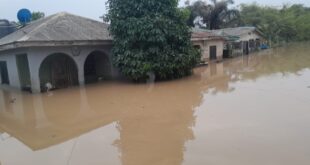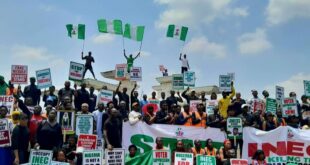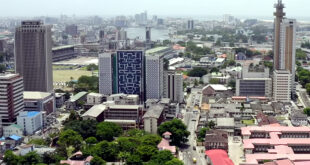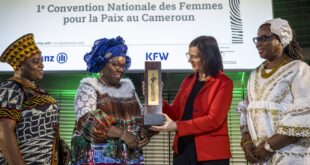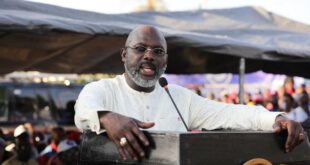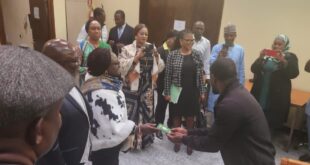News of the historic agreement between the governments of Germany and Namibia on the genocide committed by German colonial troops against the people of the African country at the beginning of the 20th century broke on Friday (28 May). It was the culmination of more than six years of talks between Berlin and Windhoek.
German imperial troops killed tens of thousands of Herero and Nama people during the 1904–1908 genocide, an event that is widely regarded as the first genocide of the 20th century and a forerunner to the atrocities of World War II.
The German government, for the first time, after more than one hundred years, has accepted that the atrocities constituted a genocide and also expressed its regrets.
In addition, Germany would spend 1.1 billion euros on development projects in Namibia over a period of 30 years as a form of restitution. The funds would be used for land acquisition, land development, water supply and vocational training, for example.
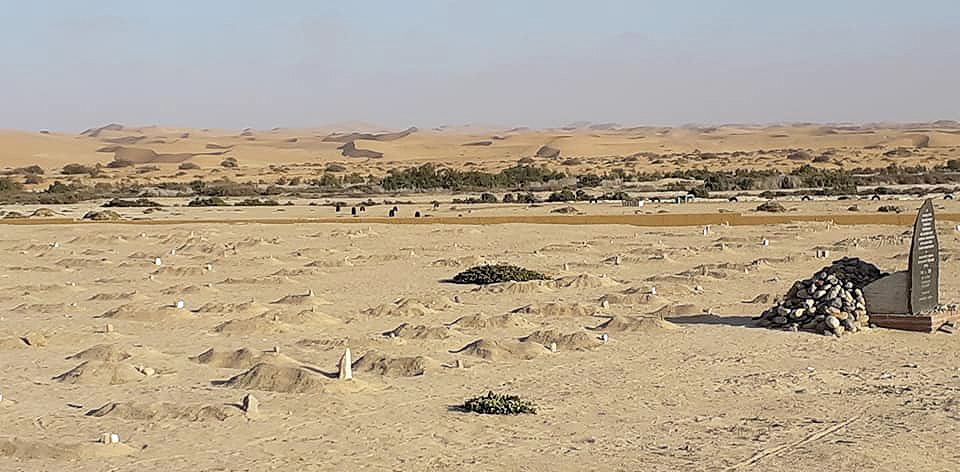
Unmarked graves of Herero and Nama people who perished in German concentration camps (1904-1908) in Swakopmund/Photo: © CIPDH, UNESCO
In a carefully worded statement, Germany said its offer of aid was a gesture of reconciliation rather than legally binding reparations.
“In light of Germany’s historical and moral responsibility, we will ask Namibia and the descendants of the victims for forgiveness,” German foreign affairs minister Heiko Maas said in the statement.
While the bilateral deal, christened ‘The German-Namibian Reconstruction and Reconciliation Agreement’, has been hailed internationally as a breakthrough, groups representing the descendants of the genocide victims have rejected it.
Since the beginning of the talks in 2015, the main Herero and Nama groups have criticised the fact that they were excluded from the negotiations and hence their demands, which should be paramount, were not addressed. The groups have consistently demanded to represent themselves directly in the talks, but their request was rejected by the Namibian government, dominated by members of the Ovambo ethnic group.
In fact, the victim groups have sued Germany in a court in New York, seeking reparations and compensation for the genocide suffered at the hands of the German colonial authorities.
“Genocide is a crime, and so that crime is already regulated by international law. The penalty for it is reparations,” said Nandi Mazengo of the Herero Genocide Foundation.
“They have not admitted guilt to that crime, which they know comes with liabilities. They have admitted guilt to a different kind of genocide. We do not know who defines it.”

After German colonial forces massacred tens of thousands of Herero and Nama in today’s Namibia (1904-08), they brought the skulls of some of their victims to Germany for eugenics research to prove the racial superiority of white Europeans. The skulls pictured above formed part of a collection of human remains that were studied in Germany to prove African inferiority. Skulls from Germany’s other African colonies, including modern day Cameroon, Tanzania, Rwanda and Togo, were also used in the discredited studies / Photo: © Screenshot/ARD
Herero chief Vekuii Rukoro also described the accord as “an insult.”
“That’s a black cat in the bag instead of reparations for a crime against humanity,” he told Reuters.
Similarly, opposition parties in Nambia have criticised the agreement.
Landless People’s Movement (LPM) spokesperson Joyce Muzengua says the deal had nothing to do with Herero and Nama people.
Speaking to The Namibian, Muzengua stressed that the agreement were not reparations, and it was still important for Germany to officially apologise for the genocide.
“LPMs stance on the matter is that if Namibia receives money from Germany, it should go to the traditional authorities of the affected communities and not to the government. Instead, the government can audit,” she said.
President of the Rally for Democracy and Progress (RDP), another opposition party, Mike Kavekotora, claimed Germany called the shots during the negotiations while Namibia merely agreed to what was on the table.
“I do not think it is the best the Namibian government could get from Germany because of their weak stance. We have seen it from the way Prime Minister Saara Kuugongelwa-Amadhila and President Hage Geingob have been addressing this matter,” he said.

A member of an OvaHerero group protesting in Windhoek on Friday after the announcement of the German-Namibia agreement. Groups representing the descendants of the victims say the deal does not deal with their demands/Photo: Courtesy of OvaHerero/Mbanderu and Nama Genocides Institute – ONGI
In the same vein, a parliamentarian of the opposition Popular Democratic Movement (PDM), Inna Hengari, argued that the offer in its current state did not reflect respectability, labelling it insulting.
“This is an insult. None of the three pillars of the initial points of the negotiations is being addressed or has been met. The three pillars are apology, acknowledge genocide and reparations. Where are they in this offer?” she asked.
“The discussion was never about projects but reparations. Germany has not been negotiating in good faith,” Henagri stressed.
Still, another opposition party, the National Unity Democratic Organisation (Nudo), said the compensation Germany was offering is development aid and not the reparation the affected communities are seeking.
“This is an insult of the highest order. Germany must acknowledge genocide and pay reparations. They totally disregard Namibia because we are black,” Nudo’s secretary general, Joseph Kauandenge, said.
“You have a government who refuses to accept genocide and pay reparations. They want to run away from their historical responsibility and hide behind development aid. To them we are inferior,” he asserted.
Kauandenge said his party was disappointed with the Namibian government for accepting the German offer.
Germany’s President Frank-Walter Steinmeier is expected to visit Namibia soon to make an historic speech, apologising for the colonial-era crime. However, Mutjinde Katjiua, Secretary-General of the Ovaherero Traditional Authority, told journalists that Steinmeier was not welcome.
“We advised the (German) ambassador that the president should stay in Germany. We will do anything in our effort to make his coming or his state unattainable,” he told reporters. “We will not accept any outcome between these two governments.”
Sola Jolaoso
Germany’s Herero and Nama Genocide
Germany ruled Namibia as a colony from 1884 to 1915 which it named Southwest Africa. In response to the seizure of their land and confiscation of their cattle, the Herero and Nama rebelled against the colonial occupiers in 1904.
In the process of putting down the resistance, German troops massacred and displaced tens of thousands of the Namibians following an extermination order by their general Lothar von Trotha, who issued the infamous order: “Any Herero found inside the German [colonial] border, with or without a gun or cattle, will be executed. I will spare neither women nor children, I will order them to be driven away or fire on them.”
Herero and Nama who escaped fighting between their warriors and colonial forces were driven into the desert, where many died of dehydration.
Survivors of the killings were taken to concentration camps, where they were abused, subject to slavery and, in some cases, to medical experiments following which hundreds of skulls from people who died at that time were taken to Germany to perform racial scientific experiments.
Germany’s brutal clampdown on the resistance of people inhabiting the territories it occupied in Africa during the colonial era also occurred in Tanzania, where its forces crushed the Maji-Maji rebellion, leading to an estimated 300,000 people losing their lives. Analysts say the deal with Namibia may also elicit demands for compensation from Tanzania as well as claims from countries like Cameroon or Togo which were also colonised by Germany.
 THE AFRICAN COURIER. Reporting Africa and its Diaspora! The African Courier is an international magazine published in Germany to report on Africa and the Diaspora African experience. The first issue of the bimonthly magazine appeared on the newsstands on 15 February 1998. The African Courier is a communication forum for European-African political, economic and cultural exchanges, and a voice for Africa in Europe.
THE AFRICAN COURIER. Reporting Africa and its Diaspora! The African Courier is an international magazine published in Germany to report on Africa and the Diaspora African experience. The first issue of the bimonthly magazine appeared on the newsstands on 15 February 1998. The African Courier is a communication forum for European-African political, economic and cultural exchanges, and a voice for Africa in Europe.




